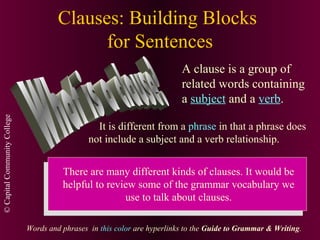Mais conteúdo relacionado
Semelhante a Clauses (17)
Mais de Angela Pereira (20)
Clauses
- 1. ©CapitalCommunityCollege
Clauses: Building Blocks
for Sentences
A clause is a group of
related words containing
a subject and a verb.
It is different from a phrase in that a phrase does
not include a subject and a verb relationship.
There are many different kinds of clauses. It would be
helpful to review some of the grammar vocabulary we
use to talk about clauses.
Words and phrases in this color are hyperlinks to the Guide to Grammar & Writing.
- 2. ©CapitalCommunityCollege
Clauses: Building Blocks
for Sentences
Clauses go by many names. Here are some definitions:
1. Independent: A clause that can stand by itself and still make
sense. An independent clause could be its own sentence, but is often
part of a larger structure, combined with other independent clauses
and with dependent clauses. Independent clauses are sometimes
called essential or restrictive clauses.
2. Dependent: A clause that cannot stand by itself. It depends on
something else, an independent clause, for its meaning. A
dependent clause trying to stand by itself would be a
sentence fragment. Dependent clauses are sometimes called
subordinate, nonessential, or nonrestrictive clauses. We will
review the different kinds of dependent clauses.
- 3. ©CapitalCommunityCollege
Clauses: Building Blocks
for Sentences
And here are some examples of independent clauses . . . .
1. Independent clauses:
• Glaciers often leave behind holes in the ground.
• These holes are called kettles, and they look just like
scooped-out pots.
• Glaciers also leave behind enormous deposits of glacial
“garbage”; these deposits are called morains.
•Kettle holes result when a large block of ice is left behind
the glacier and then melts away, leaving a large depression.
This last sentence deserves further attention . . . .
- 4. ©CapitalCommunityCollege
Clauses: Building Blocks
for Sentences
Notice that this sentence consists of a very brief independent
clause followed by a long and complex dependent clause.
•Kettle holes result when a large block of ice is left behind
the glacier and then melts away, leaving a large depression.
The dependent clause begins with what is called a
subordinating conjunction. This causes the clause to be
dependent upon the rest of the sentence for its meaning; it
cannot stand by itself.
More on dependent clauses in a moment. . . .
- 5. ©CapitalCommunityCollege
Clauses: Building Blocks
for Sentences
Independent clauses can be connected in a variety of ways:
1. By a comma and little conjunction (and, but, or, nor, for,
yet, and sometimes so).
2. By a semicolon, by itself.
3. By a semicolon accompanied by a conjunctive adverb
(such as however, moreover, nevertheless, as a result,
consequently, etc.).
4. And, of course, independent clauses are often not
connected by punctuation at all but are separated by a period.
- 6. ©CapitalCommunityCollege
Clauses: Building Blocks
for Sentences
Dependent clauses can be identified and classified according to
their role in the sentence.
Noun clauses do anything that a noun can do. They can be
subjects, objects, and objects of prepositions.
• What Turveydrop has forgotten about American politics
could fill entire libraries.
• President Johnson finally revealed what he had in mind for
his congressional leaders.
• Sheila Thistlethwaite has written a marvelous book about
how American politics and economic processes often run
counter to common sense.
- 7. ©CapitalCommunityCollege
Clauses: Building Blocks
for Sentences
Dependent clauses can be identified and classified according to
their role in the sentence.
ADVERB CLAUSES tend to tell us something about the
sentence’s main verb: when, why, under what conditions.
• After Jubal Early invaded the outskirts of Washington,
Congressional leaders took the southern threat more seriously.
• Lincoln insisted on attending the theater that night because it
was important to demonstrate domestic tranquility.
Notice how the dependent clauses begin with “dependent words,”
words that subordinate what follows to the rest of the sentence.
These words are also called subordinating conjunctions.
- 8. ©CapitalCommunityCollege
Clauses: Building Blocks
for Sentences
Dependent clauses can be identified and classified according to
their role in the sentence.
ADJECTIVE CLAUSES modify nouns or pronouns in the
rest of the sentence..
• The Internet, which started out as a means for military and academic
types to share documents, has become a household necessity.
• Tim Berners-Lee, who developed the World Wide Web, could never
have foreseen the popularity of his invention.
•The graphical user interface (GUI) that we all take for granted
nowadays is actually a late development in the World Wide Web.
Notice, now, how the subject is often separated from its verb by
information represented by the dependent clause.
- 9. ©CapitalCommunityCollege
Clauses: Building Blocks
for Sentences
Sometimes an adjective clause has no subject other than the
relative pronoun that introduces the clauses.
The Internet was started in 1969 under a contract let by the
Advanced Research Projects Agency (ARPA) which connected
four major computers at universities in the southwestern US
(UCLA, Stanford Research Institute, UCSB, and the University
of Utah).
Such clauses — all beginning with “which,” “that,” or a form
of “who” — are also known as RELATIVE CLAUSES. The
relative pronoun serves as the subject of the dependent clause
and relates to some word or idea in the independent clause.
- 10. ©CapitalCommunityCollege
Clauses: Building Blocks
for Sentences
Understanding CLAUSES and how they are connected within
the larger structure of your sentence will help you avoid
Sentence Fragments Run-on Sentences
and make it possible for you to punctuate your sentences
properly and write confidently with a variety of sentence
structures.
Don’t forget to take the quizzes listed at the end of the
section on clauses.

